Message from graduates
International Student Stories
graduate School
Postgraduate

Osaka Prefectural university’s Graduate School (research students) entrance examination was a research plan and an interview. My UJS teachers helped me a lot especially in the interview practice predicting what the interviewers would ask, such as why I came to Japan, why I chose the graduate school and why I chose this research theme and gave me lots of practice for it, and I could pass.
Nara-cho, which I study, is a particularly good example in terms of inheriting tradition and it is a proper blend of classical and modern times. They are making changes by absorbing and inheriting their own culture. My research theme is to learn from examples of Japan’s outstanding urban landscapes and compare and verify them with China’s contemporary cultural landscape. In graduate school you can learn how to analyze and solve problems, and I believe this will help me a lot for my future work. After graduating I would like to put my research knowledge into practice in concrete projects and gain experience at a Japanese design company.
When I first started learning Japanese, I was always feeling frustrated, but at UJS my teachers were always patient, taught us over and over and giving me the confidence to keep learning. I think most people in this world are mediocre, but I think a future that you never imagined awaits you if you set a goal and do not give it up.
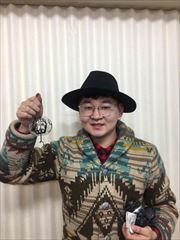
I studied at UJS with the aim of developing my overall Japanese language skill (especially the ability to listen, read and write), and at home I studied Japanese with the N2 textbook and listened to the CDs mainly focusing on reading and listening. I took my classes conscientiously at school and studied at my own pace at home. In this one and a half year, my Japanese language ability has not only improved a lot, but I have also become well accustomed to life in Japan. With regard to JLPT I passed N1 in the summer immediately after graduating from UJS.
At Tokyo University of Foreign Studies, I study grammar in my mother language, Solon. Solon is a Tungus language, without its own writing characters, used by a small number of minority people in Inner Mongolia, China. Since I was little, I wanted to do something for my own people so I decided to study my mother language and related languages and read the papers of the professor who is currently teaching me on internet. After the interview, I started researching my mother language, Solon, with him every Friday.
I’m planning to continue my studies to obtain a doctorate in the future. It’s not easy, but I think it’s best to study what I’m deeply interested in. I still remember well studying at UJS. The teachers were all kind but strict, and I learned a lot. All my classmates were nice and worked hard.
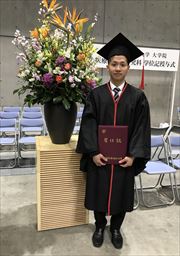
Since there was no graduate school in the field I studied at a university in my home country, I chose to study the field of physical therapy at the Graduate School of Health and Welfare at Niigata University of Health and Welfare to study advanced medical care in Japan, a developed country. It was wonderful for me to be able to expand my knowledge of the field.
In graduate school I researched inversion ankle sprain and received a scholarship from the Rotary Yoneyama Memorial Foundation. I currently work at Center Hospital of the National Center for Global Health and Medicine and work on hospital equipment and facility. I believe that this experience can be utilized in Vietnam in the future.
Nothing starts in Japan if you can’t speak Japanese. If you come to school properly, study hard and communicate with foreigners in Japanese as you do with Japanese people, you will surely become good at it. It may be difficult in the early days of coming to Japan, but if you overcome it, you will be empowered. In Japan, there is a saying that while you are young, you should experience hardships even if you have to buy them. If you study a lot, have hardships, make mistakes and have various experiences while you are young, your life experience will be abundant.
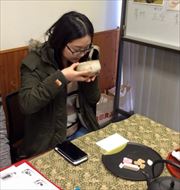
Since N1 qualification was a prerequisite for an entrance to a graduate school, I bought a workbook with a mock test collection, did it, studied hard the areas I couldn’t answer or made mistakes and repeated the process until the things I couldn’t understand or answer were all cleared. I passed N2 first as I entered UJS after completing an elementary level Japanese, then challenged N1 and passed it.
At Saitama University Graduate School of Humanities and Social Sciences, I studied the production-inducing effects of Chinese exports on Japan and Korea. Since I did my research after creating the International Input-Output Table that I needed for it, I think it became a valuable experience.
The process of completing my research independently as well as searching for resources and data
is an experience I think will be used most when I face problems and try to solve them in the future.
After obtaining the master’s degree in the graduate school, I got a job at a telecommunications company. I gained specialized knowledge related to telecommunications that I did not know before. They are, for example, knowledge of the communication business such as provider and MNP (number portability) and of communication technology such as optical line and Wi-Fi communication. Even if I change my job to a different job, I think I can make great use of the knowledge I learned here in today’s networked society. In addition I can make use of the knowledge I studied at the graduate school and think that my researching experience there has a positive impact on my work since the company is involved in trade.

When I was at UJS aiming for entry to a graduate school, I learned the importance of the Japanese Language Proficiency Test and having a research plan for it through advice from my teacher. I thought of passing N1 first, but I realized that N1 was too difficult for me at that stage, so I was studying hard focusing on grammar and vocabulary, my weakest areas with the goal of passing N2 first. In addition, I communicated actively with Japanese teachers, and my listening ability improved a lot. I passed N2 while studying at UJS and currently have N1.
I belong to the Graduate School of Education at Chiba University. I graduated from the Faculty of Education in my home country because I wanted to become a teacher from a young age, so I am currently researching career education for people with intellectual disabilities because of my interest in education. After graduation, I would like to work in education. I think that choosing a path while confirming my goals is the most important thing after coming to Japan.
University
Undergraduate

I kept in mind to try to improve my conversation skills at UJS and to talk with Japanese people as much as possible. However, because I was delivering newspapers as work to go to UJS Language Institute, I only had the opportunity to talk with Japanese at school. I enjoyed practising conversation by answering the teachers’ questions and asking them questions. Of course, it is not enough to get a high score in JLPT and EJU. It was very difficult to study science for the EJU exam, so I became anxious that I would not be able to go on to university and return home. Nevertheless, I passed JLPT N2 while I was at UJS.
I heard Chiba Institute of Technology gives applicants an examination during an interview. So I thoroughly reviewed my Japanese and science studies, took the challenge and was successful as I was able to answer well in the interview as well as the examination. The reason I majored in architecture was that I graduated from a vocational school in my home country to become a civil engineer and worked for four years, but then when I saw Japanese architecture, I wanted to be a person who could build those.
When I graduate, I will first aim to get the qualification of a Second-Class Architect. It is an important qualification to be able to design general houses. To become a First-Class Architect, my dream, requires at least four years practical experience at a Japanese architectural design firm. My dream is still a long way off, but I will do my best to achieving this goal one step at a time.

As soon as I came to Japan, I started to study aiming to go on to university. While studying at UJS I did workbooks from EJU, JLPT and so on and practised kanji and composition by myself even outside of class time. For example, I practiced essay writing by writing a 300-character essay and having it corrected by my teacher and kept doing so repeatedly. I passed N3 level of JLPT while I was at UJS, recently sat for JLPT N2 test and am currently waiting for the result.
I’m currently in the 1st year in the Department of Information and Culture, Faculty of Media and Communication Studies in Edogawa University and have received a scholarship based on my attendance rate and grades in the first semester. I’m aiming to obtain qualifications of IT passports, MOS, TOEIC and so on. You can be evaluated highly if you have a basic knowledge of IT when you are looking for a job, and being bilingual in English and Japanese will give you a wider possibility of getting employment.
After graduating from university, I would like to work in the IT industry in Japan. If you are thinking of studying in Japan in the future, I advise you to set a goal and do your best towards it because time will pass quickly if you do not have a goal. If you have a clear goal, you can spend meaningful time. You will kill two birds with one stone if you get a good result. It is of course important to study at school, but it is also important to talk with Japanese friends and actively communicate with others. I hope you will enjoy your stay and study in Japan.
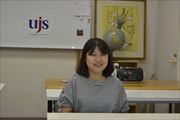
It has been four years since I graduated from UJS Language Institute, and I made a lot of great memories with my teachers and classmates while I was there for one and half years. Even now it is fun to remember them.
I entered UJS Language Institute to go on to university. I was not confident and was nervous about Japanese lessons at first, but the teachers explained Japanese words using body language, and I was able to enjoy studying. An EJU preparation specialized class was set up in order to support students who were aiming to go on to university, and I was able to participate in the class. I gained knowledge necessary at a Japanese university such as Japan and the World and Mathematics.
The road to higher education was, however, not a flat road. I would like to express my heartfelt gratitude to the teachers who advised me about going on to higher education at that time. I’ve been through a lot since I came to Japan. Of course, there were times when things weren’t going well, but when I remember my life at UJS, it gives me courage and confidence to overcome difficulties. I will continue to advance with the courage and confidence I gained through my study abroad life at UJS.

I made efforts to improve my Japanese pronunciation and to increase my vocabulary at UJS. For example, I learned Japanese pronunciation and accents by practicing them out loud, and I wrote down Japanese words on a small notebook, looked at them and remembered them on the train. It was effective to even remember the words that were difficult to remember as they were naturally memorized when viewed for a long time. I passed N1 of JLPT and went on to the Faculty of Human Sciences at Musashino University as I’m interested in people and wanted to study human beings.
I studied psychology at university, and it is really useful for my current work. I got to get on well with people at work, although it is said to be difficult, and enjoy my work every day. I had an interview at six companies in total during my job hunting. I felt that many companies were watching out for the ‘personality and character’ of applicants. I think the important things are to go step by step without rushing and if you think of something, you take actions. A nice thing about being employed by the current company is that bosses and senior employees are very kind. I’m really happy that they welcome me, are considerate of my feelings and are willing to support me with my work.
This is my advice for those who are thinking of studying in Japan. Please make the most of your time while attending a Japanese language school. This is the only time that you are taught Japanese professionally. If you don’t consolidate the foundation of it, I’m afraid that you will be facing a big barrier when socializing at university and in society in general.
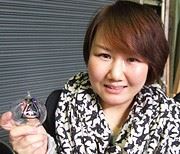
I never thought of Japan as being part of my life. However, I was fascinated by Japan, after a trip to Tokyo and seeing Japan has advanced awareness and diversity which accepts different cultures.
This made me decide to enroll in a long-term Japanese language course, and I started to learn hiragana and katakana.
When I first came to Japan, I found it difficult even to order at a fast food restaurant, but I was inspired by the positive attitude and passion of the students in my class. I decided to go to university under the guidance of my teachers and was able to pass the Faculty of Integrated Cultural Policy at Aoyama Gakuin University. I was studying Japanese aimed at acquiring the language skills that are useful for daily life, not just for passing the entrance examination. So I think that’s why I got good grades for the Japanese Language Proficiency Test. I think I also learned not only economics, society, culture, but also various things useful for life. UJS is like a treasure to me.
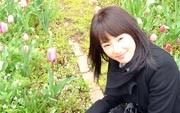
I was admiring Japan for a long time and really wanted to study in Japan someday. Experiencing different cultures was very interesting to me, and every day was like traveling to new places. I went to UJS Language Institute for a year and then went on to university.
Entering the university would have been impossible without the help of the wonderful teachers at UJS. The experiences I had at UJS for one year, with kind teachers and friends who were like my family members, are unforgettable precious life memories.
After graduating I went on to the Department of Clothing at Japan Women’s University. University has a history of more than 100 years and has a number of excellent professors. The Department of Clothing offers a variety of courses ranging from textile materials to fashion business. There was also a wonderful professor who studied astronaut clothes. In addition there is a tutoring system, where one senior student is always available to advise one international student in various aspects of student life including registering for classes and taking exams. I have made a lot of nice friends there and am really pleased to be able to study in such a good environment. I am so grateful to the teachers at UJS Language Institute who supported me so that I was able to live such a good life in Japan.
Vocational school
Vocational School

Since I was in junior high school, I had a dream to study in Japan. My dream turned into a goal, and when I came to Japan, I faced a big barrier of Japanese language in my studies. I think the most important things to overcome it are motivation and planning the path of my life. Of course, I don’t know what will happen to my life plan in the future. I may make mistakes, and it may not be realized, but I think that if I keep challenging without giving up, my efforts wouldn’t be wasted.
I had a great time at UJS with teachers teaching us thoroughly with fun. Thanks to my teachers and classmates, my Japanese improved, and I overcame the barriers. When I was preparing for the Japanese Language Proficiency Test, I was studying focusing on increasing vocabulary. I thought that increased vocabulary would help me passing as the pass rate would be higher in Kanji and reading and listening comprehension. I passed JLPT N2 while I was at UJS. The reason why I came to Japan and chose to enroll in the Information Processing Department of Nihon Electronics College was so that I could learn the basics of programming. I am currently studying languages such as C, SQL and Windows Programming. I am planning to study Java and Linux in the 2nd year and am really looking forward to it.
The basic information engineer examination is divided into the first and second semesters, and the pass rate is 25%. And it is done only twice a year. Therefore, I’m working hard for it now. It is an important qualification for the IT industry, based on areas such as strategy and management, hardware, algorithms and internet security.
After graduation I would like to work as a programmer for a Japanese company gaining knowledge and accumulating experience and test myself by working for various companies. I have never regretted coming to Japan. There were some difficult times, but the struggle enabled me to learn a lot of things. I’ve learned to cook, gained experiences in various part-time jobs, met various nice people and made a lot of friends, and think my ability to step forward is better than before. I’m eager to continue to do my best.
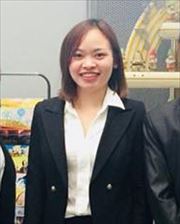
When studying at the Japanese language school, I kept in mind to focus on absorbing vocabularies that can be used daily and for work in particular. I passed N3 while attending UJS and continued to study for N2.
While studying in the Department of Business at International School of Business, I passed the 3rd Grade of the Examination in Document Design (Word) and the 2nd Grade of the Examination in Calculation Excel (Excel) by the Japan Information Processing Testing Association, the 3rd Grade in the Examination in Commercial Bookkeeping by the Japan Association of Accounting Education and N2 level in the Japanese Language Proficiency Test.
I think what is important for job hunting is to be punctual, to meet time deadlines, to understand and answer questions and to inform what you do not understand. I currently work at the Ritz-Carlton.
What I would like to advise to people who are going to study in Japan is to study hard in any case. In relation to the Japanese Language Proficiency Test it is best to obtain N2 or higher. I think the more hardships you had while you were young the easier your later life is.

When studying at a Japanese language school, grammar, learning a lot of words and listening and so on are all important. I think it’s most useful to have a lot of conversations with Japanese people. That’s how I’ve studied. I learned a lot of new words and passed N2 of JLPT.
After graduating from UJS, I am studying, aiming to be a system engineer who can master AI systems, in the Department of AI Systems at Nihon Kogakuin College. I work hard to learn programming languages such as python and java script with the goal of obtaining 4 qualifications. I’m also gaining a deeper knowledge of the latest IT technologies such as Fin tech and IoT.
I would like to work as a system engineer in Japan in the future. I love Japanese. My advice for students who are going to study in Japan is that it is better to come to like Japanese language first and study it in order to become good at it. Let’s work hard towards our goal.
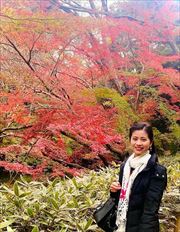
I enrolled at UJS in April 2016. At first I was full of anxiety, but thanks to the help and kindness of the teachers, I was able to do my best with peace of mind. My first step started at UJS, and everything is an unforgettable memory. If you’ve got solid base, you can go to a “high place”. It is UJS that helped me consolidate the basis for my Japanese language and communication skills.
After graduating, I entered the Department of Japanese-Chinese, Vietnamese and English Interpreting and Guiding at Waseda-Bunri College of Arts & Sciences to become an interpreter. I wanted to do useful work for Vietnamese tourists and apprentices. So I studied with interest “Clerical Interpretation”, “Trade”, “Sales and Marketing” and so on, participated in various volunteer activities, did part-time jobs and was able to deepen my understanding of cross-cultural exchange. While I was at school, I got the 3rd Grade Certificate of Service and Hospitality, the 3rd Grade Certificate in Technical Ability of Data Processing (Spreadsheet), the 4th Grade Certificate in Japan Business Ability Examination and the 4th Grade Certificate in The Japanese Kanji Aptitude Test, considering my future employment.
So I got a job at a real estate company because I thought I could make use of the knowledge and experience that I got. I became in charge of the management and education of apprentices at this company and make every effort to contribute to it as a bridge between Japan and Vietnam for the company and our clients.

I’m really glad that I studied Japanese at UJS. My teachers taught me correct Japanese in an easy-to-understand manner and advised me on the level of JLP appropriate to my ability, and I was able to pass N2 of JLPT. When I had trouble choosing a college to apply for because of too many colleges I was interested in, they recommended vocational schools that have a solid educational system with a high graduate employment rate and leave spare time to have a casual job. For the college entrance examination and interview preparation they taught me the necessary knowledge, gave me mock tests and interviews and advised me on them. Thanks to their help I could enter the Department of Car Mechanic in Yomiuri College of Car Mechanic.
While studying at the college, I obtained the 2nd Grade Gasoline Auto Mechanic License, the 2nd Grade Diesel Auto Mechanic License and a driver’s license, completed a low-pressure electric handling special course, a first aid course and a skill training course for gas welding, and they helped me getting a job. I had an interview in two companies and received a job offer from the company that I’m working for now. I think the important things in job hunting are Japanese language skill, motivation, warm personality and knowledge of work. I was able to get a job with a high basic salary and learned my job quickly.
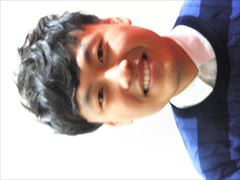
When I was in high school, I studied Japanese, as an elective subject of a second language, for a year. The most attractive reason for choosing UJS was that it is located in Roppongi, where many foreigners from various countries live. The school curriculum was also substantial, and lessons for vocabulary, reading comprehension, listening comprehension, composition and conversation were separate so I was able to clearly understand my weak areas. I studied focusing on vocabulary and reading comprehension lessons as I don’t use kanji at all in Korea.
I liked Mr. Morimoto’s EJU lessons of Japan and The World in particular. It was a class to discuss various social issues that are currently happening in Japan, and I was able to learn widely about Japanese society through these lessons.
I went on to a tourism college (JTB) after graduating UJS and then got a job at a company that provides comprehensive living support service for foreigners. The main business of this company is to support foreigners who have just arrived in Japan, and I chose the company as I wanted to help them even a little from the same foreigner’s standpoint of view. It is my dream now to play my role for foreigners living in Japan and inbound customers in the future.
I think learning a foreign language is not just learning speaking and reading, but also accepting the culture and the way of thinking of the people in the country at the same time. I recommend that it is best to have an open mind and study hard.
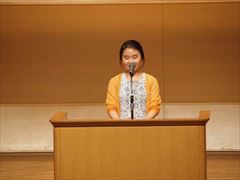
At first I studied Japanese broadly as a whole, but as I gradually came to know Japanese I became conscious of getting the JLPT qualification. So I also focused on studying for the JLPT examination. I passed N2 while I was at UJS and then N1 while I was at Tokyo English Specialist College.
I majored in General Business in the college because I wanted to learn business English that can be used in a global society and become a person who plays an active role in the international community. When I sat for their entrance examination, my English level was at the daily conversation level, but I learned English expressions in various business scenes and by the time of my graduation I was able to have business conversations and to manage business e-mails and phone calls.
I also scored 700 points in TOEIC while I was at the college. In job hunting I was able to promote myself with the high TOEIC score in job interviews, and it gave me more offers of interviews than other international students.
Currently I work for a trading company and now realize I should have made more effort with usage of honorifics. E-mails and phone calls are used a lot for business communication so it is better to study honorifics properly before getting employment.
To the prospective UJS students! If you don’t have any goals, you will end up spending two years attending school and working part-time until you graduate. So you should find out, by all means what you want to do and get N1 and N2 qualifications and English qualifications early. Society is not sweet, it is tough.
Employment
就職
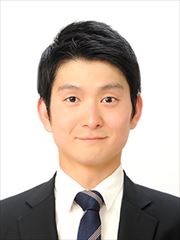
It was my dream to work overseas since I was a child. When I was at university, I became interested in Japan, which is physically and culturally close to Korea. I studied Japanese as well as my major so that I could get a job in Japan, but I decided to study the language in Japan because I wanted to improve my language skill in the country where the language is used. I searched various information to decide a Japanese language school to enroll in and got interested in a school in Roppongi, Tokyo, where various cultures are mixed, so I chose UJS Language Institute.
The good things about UJS classes were that there were not only classes using one main textbook, but also classes with various themes (conversation, composition, newspaper reading, etc.). The areas I put most effort in for Japanese language study was to understand subtle nuances of Japanese expressions that can’t be understood with dictionaries. This is because there are expressions that have the same meaning in dictionaries but are not actually used as the same meaning. I also enjoyed the school’s seasonal and annual events.
After graduation, I got a job in the aviation industry as I wanted to be a member of the aviation industry and play a role in connecting countries. I started working at Haneda Airport and after that worked for a Korean airline company at Narita Airport. In the future, I would like to become a person in the aviation industry that connects not only both countries but also the whole world.
I would like to talk about Japanese language ability to those who will come to Japan seeking employment in the future. Unlike going on to higher education, nationality does not matter for employment, and it is normal that communication skill is required as a member of the society. I think that communication ability requires a flexible way of thinking to be able to understand the Japanese society as well as Japanese language ability. Rather than thinking negatively and wondering why it is different from your own country, I think it is good to have an attitude of simply accepting Japanese society as it is. That makes communication with Japanese people and foreigners working in Japan smoother even if a little.
















 Q.L UJS Gave Me the Confidence to Continue Learning
Q.L UJS Gave Me the Confidence to Continue Learning N.D.K Buy the Hardships You Had When You Were Young
N.D.K Buy the Hardships You Had When You Were Young D.S “Towards the Dream of Becoming a First-Class Architect”
D.S “Towards the Dream of Becoming a First-Class Architect” H.M Moving Forward with a Clear Goal
H.M Moving Forward with a Clear Goal K.S My Treasure During My Study in Japan
K.S My Treasure During My Study in Japan A.A Towards My Dream with No Regrets
A.A Towards My Dream with No Regrets